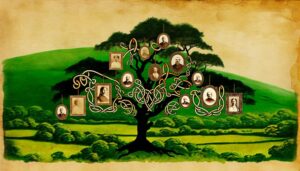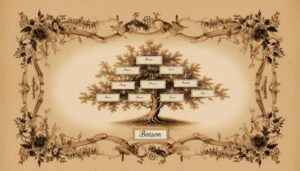Dunn Name Meaning and Origin
The surname 'Dunn' derives from the Old English word 'dunn,' meaning 'dark' or 'brown.' It transformed from a descriptor into a family name over generations. The name also has Gaelic roots, originating from 'Ó Duinn' or 'Ó Doinn,' translating to 'descendant of the brown one.' Historically, the Dunn family held prominent roles in medieval England, documented in texts such as the Domesday Book of 1086.
The name spread to Scotland, Ireland, and beyond, linked to nobility and influential landowners. To uncover fascinating details about their societal roles and migrations, there's much more to discover.

Key Takeaways
- The surname 'Dunn' originates from the Old English word 'dunn,' meaning 'dark' or 'brown.'
- It evolved from a descriptor of physical traits to a family name in medieval England.
- The name is linked to nobility, landownership, and knights in medieval society.
- Dunn is derived from the Gaelic 'Ó Duinn' or 'Ó Doinn,' meaning 'descendant of the brown one.'
- The Dunn surname has significant historical roots in England, Scotland, and Ireland.
Etymology of 'Dunn'
The surname 'Dunn' originates from the Old English word 'dunn,' which means 'dark' or 'brown,' and is believed to have been used to describe individuals with dark hair or complexion.
This term, rooted in the pre-7th century language, is reflective of the descriptive nature of early surnames, which often highlighted physical characteristics. The adjective 'dunn' appears in various historical texts and records, indicating its widespread use in early England.
Over time, 'Dunn' evolved from a mere descriptor to a family name, often passed down through generations. In addition to its use in surnames, 'dunn' influenced place names and other forms of nomenclature, illustrating its linguistic significance in medieval English society.
English Origins
Frequently traced back to the Anglo-Saxon period, the surname 'Dunn' is deeply rooted in English heritage and reflects the linguistic and cultural milieu of medieval England. Its etymology is often linked to the Old English word 'dunn,' which translates to 'dark' or 'brown,' suggesting a possible reference to physical characteristics or attire.
The name appears in historical records as early as the 11th century, notably in the Domesday Book.
Key points highlighting its English origins include:
- Historical Records: Documented in texts like the Domesday Book from 1086.
- Etymological Roots: Derives from Old English 'dunn,' meaning 'dark' or 'brown.'
- Geographical Distribution: Mainly found in regions such as Yorkshire and Lancashire during medieval times.
Irish Roots
While the Dunn surname is prominently associated with English heritage, it also holds significant historical relevance in Ireland, where it has been linked to Gaelic clans and ancient Celtic traditions.
In Irish history, the name Dunn is derived from the Gaelic 'Ó Duinn' or 'Ó Doinn,' translating to 'descendant of the brown one,' reflecting physical traits or characteristics. The Dunns were notably part of the Kingdom of Leinster, where they were established as an influential family. Historical records show that the Dunn clan played a considerable role in regional governance and military endeavors.
The surname's prevalence in Ireland underscores its deep-rooted connections to Irish culture and society, reflecting a blend of familial lineage and regional identity.
Medieval Significance
During the medieval period, the Dunn surname emerged as a symbol of nobility and influence within various European regions. This surname was often associated with landowners and knights who played pivotal roles in feudal societies. Their prominence was not merely a result of military prowess but also stemmed from their involvement in local governance and administration.
Many bearing the Dunn name held significant estates and wielded substantial power over their vassals.
Knighthood: The Dunns were frequently found among the ranks of knights, serving both local lords and monarchs.
Administrative Roles: The surname is also linked to those who managed local affairs, contributing to the stability and prosperity of their regions.
Thus, the Dunn name became synonymous with leadership and responsibility.
Geographic Distribution
The Dunn surname, historically rooted in the British Isles, particularly proliferated in Scotland and Ireland before spreading to other parts of Europe and eventually to the Americas.
In Scotland, the name is often associated with the Gaelic term ‘donn,’ meaning ‘brown’ or ‘dark,’ and is linked to Clan Dunn. The don name meaning explained reflects the cultural significance of the color brown in Scottish heritage, which often denotes stability and strength. Furthermore, members of Clan Dunn, with their storied history, take pride in the legacy tied to this name and its Gaelic roots. As a result, the don name not only serves as a surname but also as a marker of identity and belonging within Scottish clans.
In Ireland, the surname is derived from the Gaelic 'Ó Duinn' or 'Ó Doinn,' meaning 'descendant of Donn.'
From the British Isles, the name found its way to England and mainland Europe through migration and trade.
The 17th and 18th centuries saw many Dunns emigrating to North America, where they established significant populations in the United States and Canada, contributing to diverse communities across the continents.
Historical Figures
Many notable individuals bearing the Dunn surname have left an indelible mark on history, reflecting the name's rich heritage and widespread geographic distribution. Among them is Sir Patrick Dunn, a distinguished 17th-century Irish physician whose contributions to medicine were pivotal.
Another significant figure is Samuel Dunn, an 18th-century mathematician and astronomer who made strides in navigation and cartography.
The 20th century saw John Dunn, a prominent political theorist whose scholarly work reshaped modern political thought.
- Sir Patrick Dunn: Renowned 17th-century Irish physician.
- Samuel Dunn: Influential 18th-century mathematician and astronomer.
- John Dunn: Eminent 20th-century political theorist.
These historical figures exemplify the diverse achievements of individuals with the Dunn surname across various fields.
Variations of the Surname
Frequently, surnames evolve over time, leading to multiple variations that reflect linguistic, cultural, and regional influences. The surname 'Dunn' is no exception, with several notable variations emerging throughout history. These variations often result from phonetic spelling differences and adaptations to local dialects. For example, the Irish version 'Ó Duinn' directly translates to 'descendant of Duinn,' while in Scotland, it often appears as 'Dunne.' In England, 'Dunne' and 'Dunne' are also common, reflecting regional pronunciation differences.
| Variation | Region/Origin |
|---|---|
| Ó Duinn | Ireland |
| Dunn | Scotland, England |
| Dunne | England, Scotland |
| O'Dunn | Ireland |
Understanding these variations is essential for accurately tracing lineage and appreciating the historical intricacies of the Dunn surname.
Genealogical Research Tips
Commencing genealogical research on the Dunn surname can be greatly enhanced by starting with census records, which provide detailed family structures and residences over time.
Historical documents such as birth, marriage, and death certificates further enrich this quest, offering invaluable insights into lineage and heritage.
Additionally, joining genealogy forums connects researchers with a community of experts and enthusiasts, fostering the exchange of information and resources pertinent to tracing the Dunn family history.
Start With Census Records
Census records are often considered the foundation of genealogical research. They provide valuable information about individuals and families, including names, ages, occupations, and places of residence at specific points in history. These records, systematically collected and preserved, serve as a vital starting point for anyone tracing their ancestry.
When researching the Dunn family lineage, census records can illuminate familial connections and migration patterns.
- Name Variations: Census records can reveal different spellings or variations of the Dunn surname, aiding in thorough searches.
- Household Composition: Detailed listings of household members offer insights into family structure and relationships.
- Geographical Information: Recorded addresses and places of birth help track the movement and origins of ancestors.
Accurately interpreting these records can greatly enhance genealogical endeavors.
Explore Historical Documents
Exploring historical documents such as birth, marriage, and death certificates, land records, and military service files can greatly deepen your understanding of the Dunn family history.
Birth certificates provide crucial data on lineage, including parental names and places of origin.
Marriage documents can reveal familial connections and migration patterns, while death certificates often contain necessary information about previous generations.
Land records not only indicate property ownership but can also offer insights into economic status and social standing.
Additionally, military service files can uncover personal narratives and historical contexts, offering a richer understanding of an ancestor's life.
Collectively, these documents construct a detailed and nuanced genealogical portrait, indispensable for anyone seeking to trace the lineage and heritage of the Dunn family name.
Join Genealogy Forums
Participating in genealogy forums can greatly enhance your research by connecting you with a community of experienced genealogists and enthusiasts who can provide valuable insights, resources, and support in uncovering the history of the Dunn family name. These forums serve as a treasure trove of shared knowledge, where individuals exchange information on family trees, historical records, and ancestral anecdotes. Engaging in such platforms allows you to:
- Access specialized knowledge: Forum members often possess unique expertise in specific regions or historical periods.
- Collaborate on research projects: Collective efforts can lead to breakthroughs that individual research might miss.
- Discover rare documents: Forum interactions may reveal obscure records or archives not easily accessible.
Conclusion
The surname 'Dunn' embodies a rich tapestry of history and culture, juxtaposing English and Irish origins with medieval significance. While its etymology reveals roots in Old English and Gaelic languages, its geographic distribution spans continents.
Notable historical figures bearing the name have contributed to diverse fields. Variations of 'Dunn' reflect phonetic and regional adaptations.
For genealogical research, understanding these multifaceted dimensions provides invaluable insights into the lineage and heritage associated with this enduring surname.






